Estimated reading time: 6 minutes
I love to spot deer, rabbits, turkeys, osprey, and other wild creatures when I'm hiking. However, when I see that animals have been feasting on the fruits and vegetables in my garden, that's another story.
Yes, wild animals need to eat, and I don't mind providing a meal for them now and then, but I do want to limit the extent of the invitation.
Depending on where you live, it may be impossible to keep critters from feasting on some of your plants. However, there are humane ways to limit the damage. This article will focus on some solutions that are easy on the budget and include ingredients you probably already have on hand.
Want to save this post for later? Click Here to Pin It On Pinterest!
1. Clean Up Your Garden Area
Some small animals, like rabbits and groundhogs, are reluctant to venture out into open spaces. When you eliminate overgrown shrubbery, brush, and woodpiles near your garden, you make it less attractive to them.
2. Get Rid Of Other Food
If you feed your pets outside, bring their bowls inside at night when raccoons, opossums, and skunks are on the prowl. Also, use a tight-fitting lid on your compost bin, so it doesn't attract visitors.
3. Create Noise and Movement
Many animals are afraid of unexpected human noise. A time-honored solution option is to tie pie pans to stakes placed around your garden to startle animals and cause them to flee. Other scare tactics include using garden spinners or pinwheels or even putting a radio in your garden and playing music all night at a soft enough volume to annoy the animals but not you and your neighbors.
4. Install Motion Detector Sprinklers
There's nothing like a spray of cold water to discourage nibbling. Scarecrow sprinklers, also called deer sprinklers, are automatic sprinklers that contain battery-operated motion detectors. This scarecrow sprinkler has infrared sensors to detects animal heat and movement within 60 feet and comes on a metal spike for easy placement. It uses only about two cups of water per spray.
5. Spread Coffee Grounds
You may already know that coffee grounds add nitrogen to your soil and boost its acidity levels. But did you know that coffee can also deter animals? Cats dislike the smell and will stop using your garden as their litter pan. Deer and slugs also don't like the smell.
6. Sprinkle Human Hair
Now you have a use for the hair that accumulates in your hairbrush. Unwashed human hair can repel rodents, rabbits, and deer. Human hair also works as a nutritious mulch for your garden. Human hair will lose its scent after two weeks or so and will need to be replenished. If this deterrent works, you can ask your local barbershop or hair salon to give you the hair they sweep from their floors.
7. Spread Bloodmeal
Another idea is to sprinkle bloodmeal in and around your garden. Most animals dislike the smell of this by-product of meatpacking plants and will stay away from your garden because of it. The good news is that the dried blood is high in nitrogen, which is helpful for many plants. It can burn leaves, though, so avoid getting it directly on your plants.
8. Hang Scented Soap
Many gardeners report keeping deer away by hanging cheesecloth or nylon bags full of strongly-scented soap on stakes throughout their gardens. Deer are amazingly adaptable, so you will need to keep the soap fresh and in ample supply in order for this tactic to work. Also, avoid soaps that contain coconut oil, which might actually attract the deer!
9. Plant Strong-Smelling Plants As Deterrents
Some perennial herbs, including tansy, yarrow, and artemisia, and culinary herbs such as oregano, mint, thyme, chives, tarragon, and dill may keep animals away. Rabbits also dislike the smell of marigolds. Try planting them along the borders of your beds and in strategic places throughout your garden.
10. Try Hot Pepper
You might have success by sprinkling hot pepper flakes around the base of your plants. Another option is to spray a homemade hot pepper spray to deter animal pests. Mix one ounce of hot pepper sauce, four drops of natural soap, and one cup of aromatic leaves (such as marigold leaves) and spray around the base of your plants.
11. Use Vinegar
Vinegar has a strong smell that many animals will avoid. Try soaking corn cobs in vinegar for 10 minutes or more, and then place them throughout your garden. You'll need to repeat this process at least every two weeks (or after rainfall) in order for it to be effective.
12. Add Predator Urine
Urine is nature's own animal repellent. Creatures will avoid areas that smell their predators at all costs. You can purchase the urine of predators (such as coyotes, mountain lions, and foxes) from some garden supply stores and from or websites like predatorpeestore.com. (I haven't been brave enough to try this option, but it does make sense.)
13. Try a Bait and Switch Approach
Many gardeners have success in attracting animals away from their garden by planting tasty alternatives in new spots. For example, why not try letting those dandelions and clover plants grow abundantly in your yard? You may find that the local rabbits are so busy nibbling them that they leave your veggies alone.
As with many aspects of gardening, you'll need to find which of these methods work for you. Keep in mind that many animals – especially deer and raccoons – have a way of getting used to whatever deterrent you try. They may stay away for a while and then figure out that what you've done is not really a problem for them after all.
Raised beds and netting or chicken wire around plants can discourage some nibblers, but the best strategy for keeping unwanted animals out of your garden away is a sturdy fence. If deer are your nemesis, you'll need to build it at least seven feet high to keep them out. A two-foot-high fence should keep out the bunnies, but a barrier will need to be dug a minimum of a foot underground to deter groundhogs, moles, and other hungry diggers.
Since animals are such a common nuisance for gardeners, you can find a lot of resources on the subject and learn from other people's successes and failures. Here are a few to check out:
- Farm Fences and Gates: Build and Repair Fences to Keep Livestock In and Pests Out
- Mini Farming: Self-Sufficiency on 1/4 Acre
- 40 Projects for Building Your Backyard Homestead
- The Humane Gardener: Nurturing a Backyard Habitat for Wildlife
Like this post? Don't Forget to Pin It On Pinterest!


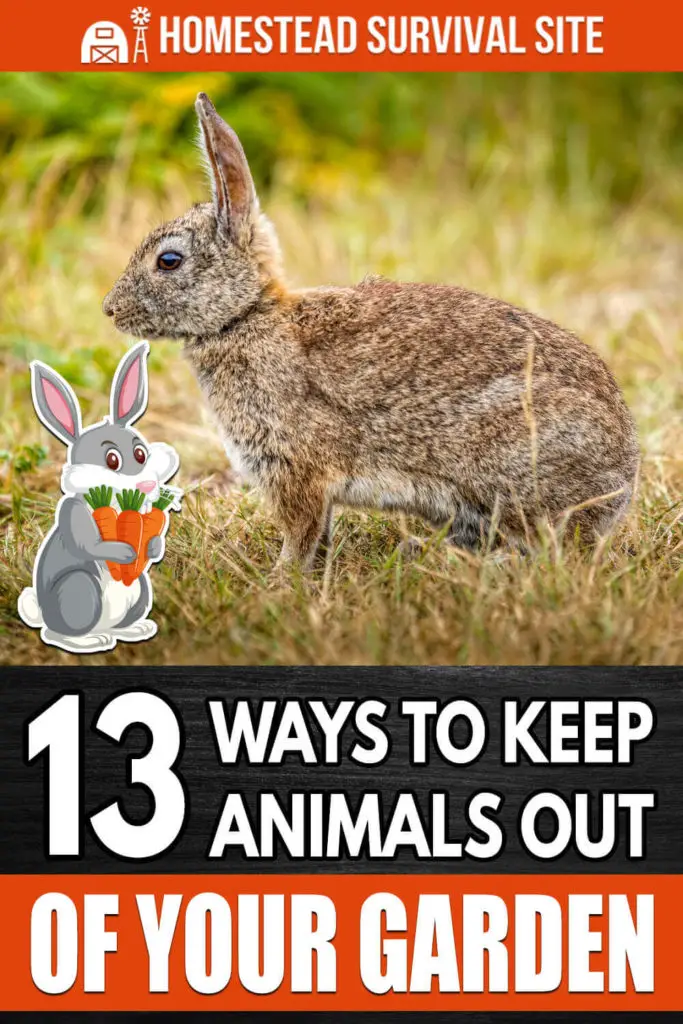


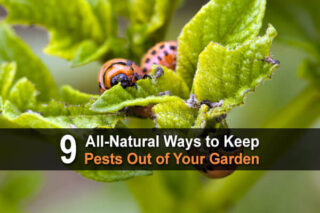
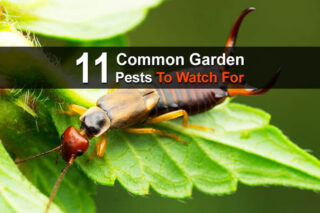
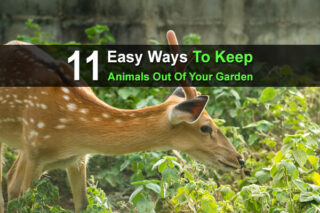
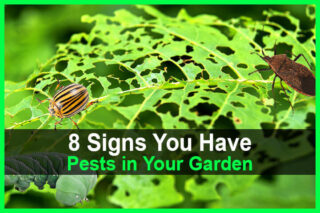

Predator urine actually attracts predators of the same species! My person preference is a 12 gauge. 12 skunks and 7 armadillos so far this season.
It sure was interesting when you said that there are flowers and herbs that many animals hate to keep wildlife away from your garden. This reminded me of deer and other wildlife species that keep damaging our plants. Maybe, it would be best for us to find an animal deterrent device that would best work to keep our garden damage-free.
A seven foot tall fence is nothing to a deer. Here in South Carolina those who run deer yards build fences that are at a minimum 10-12 feet tall. I have personally watched deer approach a 12′ tall fence and clear it without a running start. Electrical fencing/cable is often used in order to deter them. It is placed far enough away (3-4′) so that they are unable to step up and lean their head over to eat. Raccoons and Opossums are very capable of finding small holes in your fencing and getting in. I concur with the idea of noise makers and lights. They will need to be moved around on a regular basis or else the animals with become acclimated to it and no longer afraid. An occasional firecracker or bottle rocket launched in their general direction when caught inside the fence will also help to deter them. Sometimes though, you will find that there is no other option besides a lethal one. You might try live trapping, but what are you going to do with that animal once caught? There are laws about catch and release (re-location), plus outside of the legal ramifications, you are removing an animal from an environment it lives in and dropping it into one that is unfamiliar. Shelter and food have been removed, and there may be predators now that it has to deal with. If the idea of lethal removal makes you squeamish, contact your state Department of Natural Resources to enquire as to whether or not they have a listing of animal control operators. Lastly, about the sprinklers. I have seen these work well repelling birds such as black or turkey vultures. Not sure about the other animals (with maybe the exception of cats).